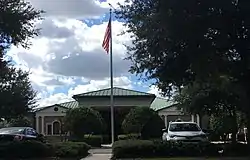Mango, Florida
Mango is a census-designated place (CDP) in Hillsborough County, Florida, United States. The population was 11,313 at the 2010 census,[4] up from 8,842 at the 2000 census.
Mango, Florida | |
|---|---|
 | |
 Location in Hillsborough County and the state of Florida | |
| Coordinates: 27°59′22″N 82°18′16″W | |
| Country | United States |
| State | Florida |
| County | Hillsborough |
| Area | |
| • Total | 4.81 sq mi (12.46 km2) |
| • Land | 4.67 sq mi (12.09 km2) |
| • Water | 0.14 sq mi (0.37 km2) |
| Elevation | 52 ft (16 m) |
| Population (2020) | |
| • Total | 12,699 |
| • Density | 2,720.44/sq mi (1,050.38/km2) |
| Time zone | UTC-5 (Eastern (EST)) |
| • Summer (DST) | UTC-4 (EDT) |
| ZIP code | 33550 |
| Area code | 813 |
| FIPS code | 12-42850[2] |
| GNIS feature ID | 0286372[3] |
Geography
Mango is located north of the geographic center of Hillsborough County at 27°59′22″N 82°18′16″W (27.989333, -82.304395).[5] It is bordered to the north by Thonotosassa, to the east by Seffner, to the south by Brandon, and to the west by East Lake-Orient Park. Interstate 4 forms the northern boundary of the CDP, and Interstate 75 is the western boundary. The main road through the center of Mango is Dr. Martin Luther King Jr. Boulevard (Florida State Road 574). Downtown Tampa is 10 miles (16 km) to the west, and Plant City is 12 miles (19 km) to the east.
According to the United States Census Bureau, the Mango CDP has a total area of 4.8 square miles (12.4 km2), of which 4.7 square miles (12.1 km2) are land and 0.1 square miles (0.3 km2), or 2.95%, are water.[4]
Demographics
| Census | Pop. | Note | %± |
|---|---|---|---|
| 1990 | 8,700 | — | |
| 2000 | 8,842 | 1.6% | |
| 2010 | 11,313 | 27.9% | |
| 2020 | 12,699 | 12.3% | |
| source:[6] | |||
At the 2000 census there were 8,842 people, 3,289 households, and 2,302 families residing in the community. The population density was 1,927.1 inhabitants per square mile (744.1/km2). There were 3,617 housing units at an average density of 788.3 per square mile (304.4/km2). The racial makeup of the community was 86.97% White, 6.44% African American, 0.58% Native American, 0.72% Asian, 0.05% Pacific Islander, 2.40% from other races, and 2.85% from two or more races. Hispanic or Latino of any race were 9.16%.[2]
Of the 3,289 households, 37.0% had children under the age of 18 living with them, 46.0% were married couples living together, 17.1% had a female householder with no husband present, and 30.0% were non-families. 22.1% of households were one person, and 6.2% were one person aged 65 or older. The average household size was 2.68 and the average family size was 3.10.
In the community the population was spread out, with 29.1% under the age of 18, 8.7% from 18 to 24, 32.8% from 25 to 44, 21.0% from 45 to 64, and 8.4% 65 or older. The median age was 33 years. For every 100 females, there were 100.8 males. For every 100 females age 18 and over, there were 96.3 males.
The median household income was $33,989 and the median family income was $37,818. Males had a median income of $29,038 versus $22,947 for females. The per capita income for the community was $15,478. About 9.1% of families and 12.6% of the population were below the poverty line, including 20.1% of those under age 18 and 4.0% of those age 65 or over.
By 2010 the census showed 11,313 people, a 28% increase over 2000.
Population change by race:
| Race group | Population (2000) | Percentage (2000) | Population (2010) | Percentage (2010) | Numeric change | Percent change |
|---|---|---|---|---|---|---|
| American Indian and Alaska native alone | 51 | 0.58% | 85 | 0.75% | 34 | 66.67% |
| Asian alone | 64 | 0.72% | 173 | 1.53% | 109 | 170.31% |
| Black or African American alone | 569 | 6.44% | 1,744 | 15.42% | 1,175 | 206.50% |
| Native Hawaiian and Other Pacific native alone | 4 | 0.05% | 18 | 0.16% | 14 | 350.00% |
| Some other race alone | 212 | 2.40% | 881 | 7.79% | 669 | 315.57% |
| Two or more races | 252 | 2.85% | 346 | 3.06% | 94 | 37.30% |
| White alone | 7,690 | 86.97% | 8,066 | 71.30% | 376 | 4.89% |
Schools
Elementary schools
- Mango Elementary School
See also
- Mango-Seffner, Florida, a single census area recorded during the 1980 Census.
References
- "2020 U.S. Gazetteer Files". United States Census Bureau. Retrieved October 31, 2021.
- "U.S. Census website". United States Census Bureau. Retrieved January 31, 2008.
- "US Board on Geographic Names". United States Geological Survey. October 25, 2007. Retrieved January 31, 2008.
- "Geographic Identifiers: 2010 Demographic Profile Data (G001): Mango CDP, Florida". American Factfinder. U.S. Census Bureau. Retrieved May 4, 2017.
- "US Gazetteer files: 2010, 2000, and 1990". United States Census Bureau. February 12, 2011. Retrieved April 23, 2011.
- "CENSUS OF POPULATION AND HOUSING (1790-2000)". U.S. Census Bureau. Retrieved July 17, 2010.
